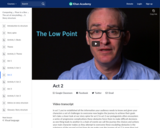
Overview of Act 2.
- Subject:
- Applied Science
- Arts and Humanities
- Computer Science
- Graphic Arts
- Material Type:
- Lesson
- Provider:
- Khan Academy
- Provider Set:
- Pixar
- Author:
- Disney Pixar
- Khan Academy
- Date Added:
- 07/14/2021

Overview of Act 2.
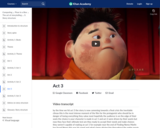
Introduction to Act 3.

Students write and perform a skit or monologue that brings awareness to a specific issue addressed in the text.
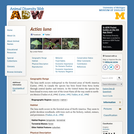
This is an information sheet on the species, Actias luna, provided by the University of Michigan Museum of Zoology.

A collection of acting exercises for theatre students.

A tongue-twister activity for theatre students.
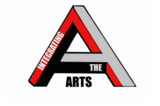
This resource was created by Jill Anderson, in collaboration with Dawn DeTurk, Hannah Blomstedt, and Julie Albrecht, as part of ESU2's Integrating the Arts project. This project is a four year initiative focused on integrating arts into the core curriculum through teacher education, practice, and coaching.
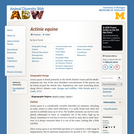
This is an information sheet on the species, Actinia equina, provided by the University of Michigan Museum of Zoology.

This resource is a video abstract of a research paper created by Research Square on behalf of its authors. It provides a synopsis that's easy to understand, and can be used to introduce the topics it covers to students, researchers, and the general public. The video's transcript is also provided in full, with a portion provided below for preview:
"Actinobacteria are some of the most widely distributed bacteria in soils and are well known for their ability to degrade plant residues in pure culture in the laboratory. Yet, despite the importance of microbe-driven decomposition to carbon sequestration in terrestrial systems, their importance and specific activity across diverse environments in the field are unknown. Researchers recently evaluated the ecophysiological roles of Actinobacteria in rice straw residue decomposition in a series of field and microcosm experiments. They found that although Actinobacteria represented only 4.6% of the total bacterial abundance, they encoded 16% of the total carbohydrate-active enzymes (CAZymes) involved in the breakdown of carbohydrates. The researchers also found that Actinobacteria taxonomic and functional compositions were relatively stable during straw decomposition and that the importance of Actinobacteria in decomposition increased as soil fertility decreased..."
The rest of the transcript, along with a link to the research itself, is available on the resource itself.
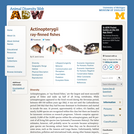
This is an information sheet on the species, Actinopterygii, provided by the University of Michigan Museum of Zoology.
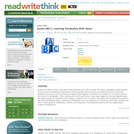
Creating an illustrated alphabet book of action words, from "attack" to "zap", reinforces the definition of verbs as it stretches and expands students' vocabulary.
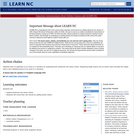
This lesson plan teaches students to elaborate on an event in a narrative by expanding their sentences into action chains. The result is a more detailed picture of an event in a narrative.
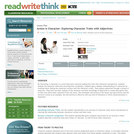
Students must "become" a character in a novel in order to describe themselves and other characters using powerful adjectives.
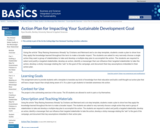
Using the article "Stop Raising Awareness Already" by Cristiano and Neimand and a six-step template, students create a plan to show how they apply the knowledge learned throughout the term to make a broader impact. The students are asked to very narrowly choose a single action they want a group of stakeholders to take and develop a multiple-step plan to accomplish the action. The students are required to select and justify a targeted stakeholder, develop an action, identify a messenger that can influence their targeted stakeholder to take the action, develop a sticky message relating the "ask" to the goal of the campaign, and document their key assumptions imbedded in their action plan.
(Note: this resource was added to OER Commons as part of a batch upload of over 2,200 records. If you notice an issue with the quality of the metadata, please let us know by using the 'report' button and we will flag it for consideration.)
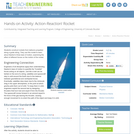
Students construct rockets from balloons propelled along a guide string. They use this model to learn about Newton's three laws of motion, examining the effect of different forces on the motion of the rocket.
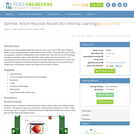
Students make rockets that travel along a string.
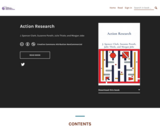
Action research is a common journey for graduate students in education and other human science fields. This book attempts to meet the needs of graduate students, in-service teachers, and any other educators interested in action research and/or self-study. The chapters of this book draw on our collective experiences as educators in a variety of educational contexts, and our roles guiding educator/researchers in various settings. All of our experiences have enabled us to question and refine our own understanding of action research as a process and means for pedagogical improvement.
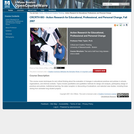
This course covers techniques for and critical thinking about the evaluation of changes in educational practices and policies in schools, organizations, and informal contexts. Topics include quantitative and qualitative methods for design and analysis, participatory design of practices and policies, institutional learning, the wider reception or discounting of evaluations, and selected case studies, including those arising from semester-long student projects.

Short Description:
This text is an OER remix of the following resource: Clark, J. S., Porath, S., Thiele, J., & Jobe, M. (2020). Action research. New Prairie Press.
Word Count: 30262
(Note: This resource's metadata has been created automatically by reformatting and/or combining the information that the author initially provided as part of a bulk import process.)
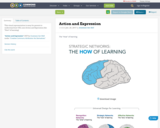
This visual representation is away for parents to understand how UDL uses Action and Expression (the "How" of learning)